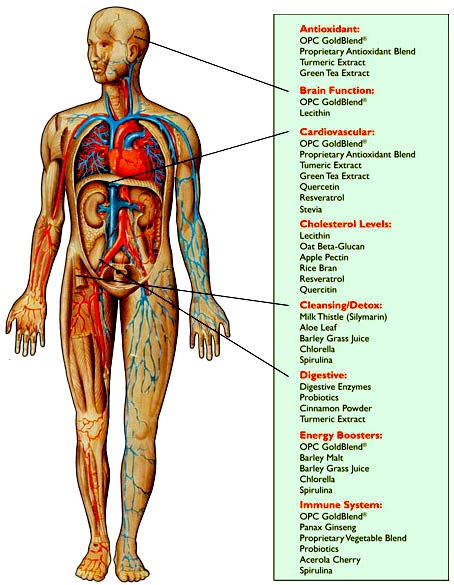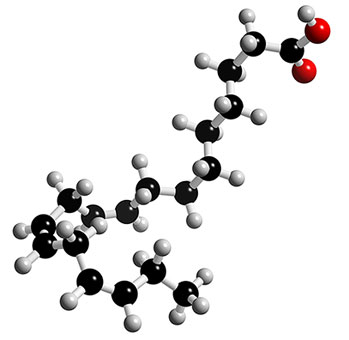
 BY ELIZABETH FIEND LIVING EDITOR Never even heard of vitamin F, have you? Well, that’s why I’m here. Vitamin F is more commonly known as a group of three EFAs, or essential fatty acids. If you’ve ever heard the phrase fish is brain food, EFAs are the reason why that’s true. There are three essential fatty acids we require for optimum health. Omega-3, -6 and -9. These fatty acids are required by our bodies to maintain healthy brain, cell and blood function as well as healthy immune, digestive and nervous systems. The “essential” means that this is a nutrient our bodies need but can’t manufacture. EFAs must come from a food source.
BY ELIZABETH FIEND LIVING EDITOR Never even heard of vitamin F, have you? Well, that’s why I’m here. Vitamin F is more commonly known as a group of three EFAs, or essential fatty acids. If you’ve ever heard the phrase fish is brain food, EFAs are the reason why that’s true. There are three essential fatty acids we require for optimum health. Omega-3, -6 and -9. These fatty acids are required by our bodies to maintain healthy brain, cell and blood function as well as healthy immune, digestive and nervous systems. The “essential” means that this is a nutrient our bodies need but can’t manufacture. EFAs must come from a food source.
Our ancestors got their essential fatty acids from eating fatty fish, placenta, eyeballs, testes, brains and other organ meats. Chances are you’re not eating enough of these foods to fulfill your body’s essential fatty acids needs. Due to changes in our tastes, coupled with our over-consumption of processed foods, the balance of essential fatty acids in our diets has become skewed towards excessive amounts of omega-6 and 9, and we’re just not getting enough omega-3.
Flaxseed is by far the most concentrated vegetable source of omega-3. Flaxseed provides alpha-linolenic acid, which our bodies convert into omega-3 fatty acids. Flaxseed oil’s properties as a health aid are controversial, mainly because of an American bias against vegetarianism. No one is saying flaxseed oil is bad for you — experts agree we need omega-3. The debate centers on what source is best.
mainly because of an American bias against vegetarianism. No one is saying flaxseed oil is bad for you — experts agree we need omega-3. The debate centers on what source is best.
But I have personal experience with adding omega-3s in the form of flax seed oil into my diet and it really, really, I mean, really helped me. I don’t usually go around telling people, but I have a pain disorder, Reflex Sympathetic Dystrophy, RSD. It’s a disorder of the sympathetic nervous system. The most simplistic description of the disorder is that my body won’t “let go” of an injury and relives the pain caused by an injury over and over again — unexpectedly, endlessly — for years.
Unfortunately, I’ve had several injuries that are trapped in a RSD cycle of pain. Some as simple (but still painful) as a sprained thumb and a dislocated shoulder, others much more complicated. Ten years ago I was in the back seat of a car that was broad-sided by a water-tanker truck. Besides your usual whiplash, the backs of my head and neck were bombarded with heavy chunks of windshield glass. I ended up with one of those neck injuries that doctors can’t seem to cure. I was in HORRIBLE, HORRIBLE continuous pain.
Because the medical community was unable to help me (at all) I sought out information on my own. I found an article that mentioned omega-3 fatty acids and their ability to relieve inflammation and pain. I was desperate and thought I’d give them a chance. After just a few days of adding omega-3 fatty acids, in the form of flaxseed oil, to my diet my pain was reduced. After a short while I was no longer in constant pain. It was really a miracle for me.
Flaxseed oil did not cure my RSD, but it did greatly reduce the severity and length of pain. There’s currently no cure for RSD. At Drexel University a doctor is floating a cure that injects doses of ketamine large enough to put the patient in a coma for five days in an effort to “reboot” the patient’s brain. Ketamine, yeah that’s the club-drug Special K. But that’s whole different column… Omega-3 fatty acids are highly recommended for pain relief, especially pain linked to inflammation like arthritis. They reduce pain by flushing out the waste that’s accumulated and gotten stuck around your joints. But they do more, much more for you.
 In the simplest terms, omega-3 fatty acids add resilience and lubrication throughout our entire bodies. Omega-3s basically work by lubricating the body from the inside out. This lubrication prevents dry skin and other dryness like in nasal passages or your vagina. It prevents constipation and even hair loss.
In the simplest terms, omega-3 fatty acids add resilience and lubrication throughout our entire bodies. Omega-3s basically work by lubricating the body from the inside out. This lubrication prevents dry skin and other dryness like in nasal passages or your vagina. It prevents constipation and even hair loss.
But omega-3s can also save your life.
Omega-3s can reduce high blood pressure. Their lubricating action thins blood. They can protect clotting of the arteries by making cholesterol more soluble and they inhibit tumor growth by flushing free radicals out of our bodies. Omega-3 fatty acids even help with weight loss by controlling insulin production. This means they’re important in preventing diabetes too.
Omega-3s bring oxygen to cellular membranes which calm the brain, reducing stress and worry. Omega-3 fatty acids have shown promise in helping people who suffer from mental disorders. But they’re also great for soothing the regular worries and stress of daily life, probably because they enhance cell flexibility which is needed for optimal nerve and signal transmissions.
Flaxseed oil, an unrefined polyunsaturated vegetable oil, is by far the best plant source of omega-3. Flaxseed oil is also lignan rich. Lignans, a type of natural plant chemical (photochemical) contained within the cell matrix of the flaxseed, enhance health benefits. The optimum dosage of flaxseed oil is one tablespoon of a flaxseed oil that contains lignans a day. (Important: check the bottle it MUST say “contains lignans.”) The brand I use is Barleans and I get it in the refrigerator section of Whole Foods or Essene Market.
Caution! Start out slow and take only about ? teaspoon a day for a week or so and then build up. Introducing too much fatty acids into an accustomed body can cause diarrhea. Flaxseed oil is fragile and destroyed by heat and light. It comes in a light-proof bottle and must be refrigerated. Shake vigorously to mix-in the lignans which are heavier than the oil and sink to the bottom of the bottle. Your oil should look like it has streaks of brown swirled in with the gold of the oil.
I know it seems counter intuitive, but adding this oil to your diet will not make you gain weight. A biological process called thermogenesis occurs when you ingest essential fatty acids. It kicks specialized cells in your body into high gear causing them to actually burn more fat. You can’t cook (or heat) flaxseed oil but you can make a salad dressing with it or stir it in to oatmeal or add to blender drinks. Or just be a man and take the oil straight like I do — right off a spoon. Yeah, it’s like the old cod liver oil of yore, but in vegetable form.
like I do — right off a spoon. Yeah, it’s like the old cod liver oil of yore, but in vegetable form.
I know it’s going to be a pretty hard sell to get the kids, or even hubby, to eat oil straight off a spoon. Smart moms, like Citizen Mom, work in some extra omega-3s by sneaking a few tablespoons of Red Mill flax meal into food, pancakes to meatballs, whenever possible. You can also grind fresh flaxseeds (available in your health food store) in a coffee grinder and eat in the above ways. Eating the seeds whole won’t work, your body can’t digest them and they’ll just pass through whole — if you know what I mean. You can also purchase fortified flax powder. Omega-Life makes some. The dosage is 1-2 tablespoons mixed in a beverage or sprinkled on cereal, salad, stew, etc.
Omega 3 fatty acids are also found in abundance in fatty fish, which is one of the reasons the Mediterranean Diet is so healthy for you. So why take flaxseed oil, and not simple eat fish or take fish oil supplements? Number one reason, for me anyway, is that fish are living creatures and I don’t feel comfortable eating animals. But there are other reasons. Fish oil doesn’t have the same ratio of omega-3 to omega-6 as flaxseed oil. Fish oil has more omega-6, which Americans already get plenty of already.
If you don’t care about eating a fish, know that fish and fish oil supplements are unregulated. Greenpeace claims that fish oil is often contaminated by chemical pollutants, especially DDT. And then there’s that problem with fatty fish and mercury, but most flaxseed oil products are certified organic and are regulated as to purity.
Sources and For More Information:
University of Maryland Medical School:
http://www.umm.edu/altmed/articles/omega-3-000316.htm
Linus Pauling Institute, Oregon State University:
http://lpi.oregonstate.edu/infocenter/othernuts/omega3fa/
Dr. Barry Sears (author of “The Zone Diet”):
http://www.askdrsears.com/html/4/T041700.asp#T041703
American Heart Association on fatty fish and mercury:
http://www.americanheart.org/presenter.jhtml?identifier=3013797
Barleans: the flaxseed oil I purchase:
http://www.barleans.com/flaxoil.asp
RSD and Special-K:
http://www.newyorker.com/archive/2005/10/10/051010fa_fact_groopman
ABOUT THIS COLUMN: At no time in recorded history have we possessed so much knowledge about health and nutrition, nor have we ever had such vast and effective machinery for disseminating that knowledge — and yet, for all intents and purposes, we live in hi-tech Dark Age with the vast majority of the global population essentially ignorant or confused about the basic facts of their own biology. How did this happen? Well, that’s a whole six-part mini-series in and of itself, but the short answer is that the bottom line of many a multi-national corporation is dependent on that ignorance, and vast sums of money are expended to maintain it. The global warming argument is a classic example. When scientific fact did not favor Big Oil, they hired their own scientists to to conduct and publish studies that contradicted the peer-reviewed facts about the environmental impact of carbon-based emissions. As a result, whenever the latest global warming news is relayed to the public, it always comes with the caveat that “some dispute these findings.” There was time when newspapers saw it as their duty to truth squad these debates, but that’s long since become a luxury most papers can no longer afford — better to hire another gossip columnist and give the people what they want. To fill this crucial gap, Phawker began publishing the JUNK SCIENCE column by Elizabeth Fiend, beloved host of Big Tea Party. Every week, Miss Fiend connects the dots to reveal a constellation of scientific facts that have been hiding in plain sight — scattered across the vast, cold reaches of the Internet. With a background in punk rock and underground comics, and longstanding employment as a library researcher, Miss Fiend doesn’t pretend to be a scientist or an expert. She does, however, know how scientific facts become diluted by corporate-sponsored non-facts, and every week she separates the smoke from the mirrors. Why? Because she loves you.
